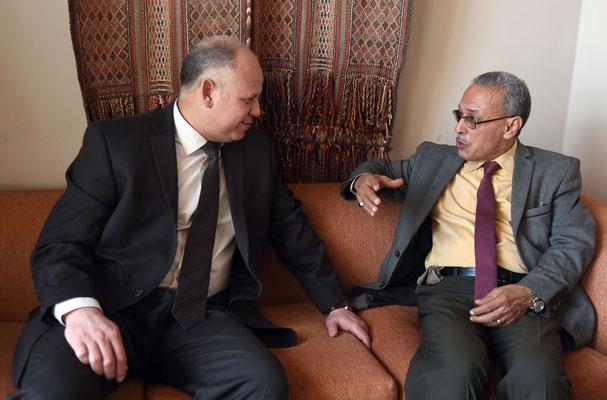You are here
Agreement to end Libya strife a hard sell — analysts
By AFP - Dec 07,2015 - Last updated at Dec 07,2015

Awad Mohammed Abdul Sadiq (left), the first deputy head of the Tripoli-based General National Congress and Ibrahim Fethi Amish, from the internationally recognised House of Representatives, speak ahead of a ceremony of signing documents on reaching an agreement on ending the political deadlock in Libya, in the Tunisian town of Gammarth, on the outskirts of Tunis, on Sunday (AFP photo)
TRIPOLI — An agreement towards ending strife-torn Libya's long political crisis has been hailed as a breakthrough but does not address key issues and will struggle to win approval, analysts and lawmakers say.
A deal to end years of political deadlock is seen as crucial to restoring stability in the oil-rich North African nation and to tackling the rising threat from the Daesh terror group.
Delegates from the country's rival parliaments said they reached a deal late on Saturday on a "declaration of principles" to resolve a crisis that has endured since the October 2011 overthrow of dictator Muammar Qadhafi.
Officials from the internationally recognised House of Representatives and the Tripoli-based General National Congress had been holding secret talks, without the United Nations, in the suburbs of Tunis since Friday.
"Both teams will have to sell the initiative in their camps and will likely face pressures in doing so," Mohamed El Jareh, from the Atlantic Council's Hariri Centre for the Middle East, told AFP.
"The agreement is attractive and very simple in its form, not complicated — but when we get into the details and raise questions, there will be many outstanding and controversial issues," the Libyan analyst said.
Some analysts suggested supporters of the agreement would even struggle to have it put forward in the country's rival legislatures.
"It is hard to tell whether the proposal will actually be put to a vote given that both parliaments are controlled by hardliners," said Mattia Toaldo, a policy fellow at the European Council on Foreign Relations.
Libya descended into chaos after the ouster and killing of longtime dictator Qadhafi, with two governments vying for power and armed groups battling for control of its vast energy resources.
No word on army
A militia alliance including Islamists overran Tripoli in August 2014, establishing a rival government and a parliament and causing the internationally recognised administration to flee to the country's remote east.
The Tunis agreement comes after lawmakers from both sides in October rejected a UN-backed power-sharing deal under which Libya would be governed by a nine-member presidential council made up of a prime minister, five deputy premiers and three senior ministers.
The new document provides for one committee to nominate a prime minister within 15 days and another to conduct a review of Libya's constitution.
It does not, however, address important issues such as the future of controversial Libya army chief General Khalifa Haftar.
The internationally recognised parliament opposes any agreement that does not guarantee him a future, while the Tripoli-based legislature does not want him to have a role.
"This proposal doesn't say a clear word about the army and General Haftar, ultimately sidestepping the crucial issue of how to guarantee the security of the new government," Toaldo said.
But lawmakers said they were keen to move forward despite the potential hurdles.
"The vote on this initiative will go ahead inside the House of Representatives — even if it will meet with opposition inside it," said Abu Baker Bueira, a member of the internationally recognised parliament.
The LANA news agency close to Tripoli authorities said on Monday that the head of the GNC "was striving with all sides to implement the agreement towards solving the political crisis in Libya."
'First step'
Libyan politicians say that, despite its shortcomings, the agreement is a first step towards a solution.
Issa Al Uraybi, a member of the internationally recognised parliament, said the Tunis agreement was a "better choice" than the UN blueprint.
"Libyans sitting down together without any foreign interference is what led to this initiative being welcomed," he said.
An official in Tripoli who requested anonymity agreed.
"Even if it is lacking, it is a first step far from any foreign interference or pressure," he said. "Today we have reclaimed the right to build our peace ourselves."
UN special envoy for Libya Martin Kobler did not directly comment on the Tunis agreement on Sunday, but stressed that the UN-brokered Libyan Political Agreement was the only way towards peace.
The Tunis initiative comes as experts and sources in Libya say Daesh militants are seeking to expand beyond their Libyan stronghold Sirte.
Daesh first appeared in Libya in 2014 when a group of Libyan Daesh militants returned from Syria and reorganised in the port city of Derna, declaring eastern Libya to be a province of the caliphate.
"IS [Daesh] can only be stopped if both authorities unite," the official in Tripoli said.
Related Articles
TUNIS — Libya's warring factions said Sunday they had reached an agreement on how to move forward on ending the country's political deadlock
TRIPOLI — UN envoy Martin Kobler said on Sunday his team is in contact with security officials in Tripoli to ensure that Libya's new unity g
UNITED NATIONS — The United Nations Security Council voted Wednesday to endorse an agreement between rival Libyan political factions to form














